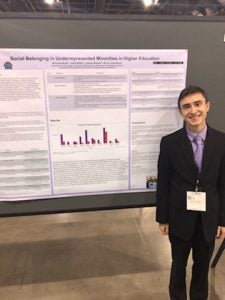Nick Bush was recognized for his study on the minority experience in higher education

A College of Health Sciences student studying “social belonging” among minority students in higher education was recognized recently for his work at a national conference.
Nick Bush, a third-year psychology major, won an “outstanding poster presentation” award at the annual Biomedical Research Conference for Minority Students, hosted by the National Institute of Biomedical Imaging and Bioengineering in Phoenix, AZ, Nov. 9-13. Bush’s award was one of just 400 given among about 5,000 participants.
Bush’s project — “Social Belonging in Underrepresented Minorities in High Education” — looks at how social belonging affects the college experience for minority students. Through interviews with black and white students, Bush aims to discover why a disproportionate number of minority students drop out of school, as opposed to white students.
While his work is ongoing, Bush has observed that white students do not tend to think about or notice race as deeply as minority students, while black students all told of witnessing overt acts of racism on campus. He said he is also finding that black students tend to have more difficulty building relationships on campus, tending to rely more on social groups from their hometown than on those formed on campus. White students appear more amenable to building new relationships, he said.
Bush, a white student from Burrillville, RI, acknowledges he did not have a diverse background growing up, which is part of why he became interested in studying minority issues during his freshman year at URI, which has a 30 percent minority population, about the national average for a university, according to collegefactual.com.
“My entire life had been in private school. I could count on two hands the number of minority students I went to school with,” Bush said. “URI was a culture shock. I didn’t know anything about the minority experience. This gave me a chance to get outside my comfort zone and experience something new.”
Bush, who attended the conference with Biological Sciences Assistant Professor Bryan Dewsbury and fellow student Liz Mylin-Ramos, presented his work in written and oral form at the conference, earning the award and making connections with other researchers. The connections will help in his future career, and in applying to graduate school, he said. Bush plans to pursue a Ph.D in clinical psychology, a path he said he is more sure of now.
“I think we all at some point start to question if we made the right decision with our careers,” Bush said. “Attending the conference gave me confidence I’m going down the right path.”

